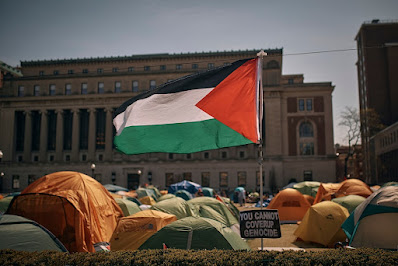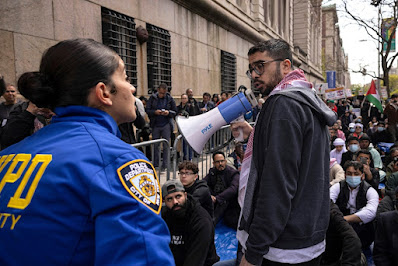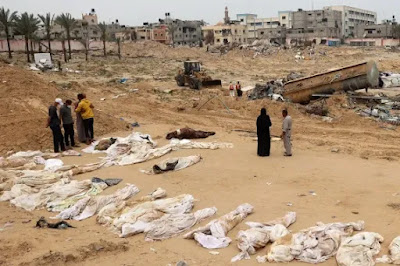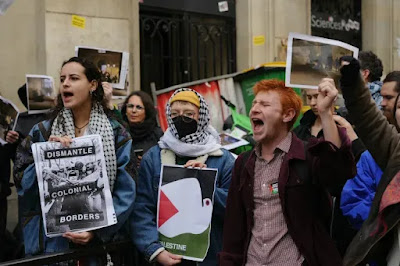Democrats Push for Further Crackdown on Columbia University Students
By Al Mayadeen English
Democrats join Republicans in calling for the disbandment of the encampments at Columbia University as the students garner more and more international attention.
The Columbia University board has recently come under pressure from several Democrat House Members to end the ongoing encampment and protests against the genocide in Gaza, demanding that the faculty "act decisively" in the face of the student protests, Axios reported on Monday.
This group of House Democrats sets a precedent, as the Republicans have been leading the campaign against the pro-Palestine students, and though the Democrat Biden administration is responsible for the police crackdown on these students, the party itself had not publicly adopted any policy on the demonstrations.
Some 21 lawmakers signed a letter to the university's board in which they voiced their "disappointment that, despite promises to Columbia University has not yet disbanded the unauthorized and impermissible encampment of anti-Israel, anti-Jewish activists on campus," Axios said, which echoes the same rhetoric of Republicans who are calling the protesters anti-Semitic for their anti-Zionist sentiment and despite there being countless Jewish students mobilizing for the cause.
Calling for the disbandment of the encampments on campus, the lawmakers, led by New York's Dan Goldman and New Jersey's Josh Gothheimer, warned that "if any Trustees are unwilling to do this, they should resign so that they can be replaced by individuals who will uphold the University's legal obligations under Title VI."
Panel against suppression of protests
The President of Columbia University faced increased pressure on Friday as a campus oversight committee strongly condemned her administration's actions in suppressing a pro-Palestine demonstration in the school.
Universities across the United States have witnessed in the past few weeks a historic surge in student protests in support of Palestine and Gaza, calling for ending all agreements with "Israel" and divesting from the occupation entity. Students also demanded an end to US support to "Israel" and involvement in the genocidal war.
Cross-country protests in the US continue to grow as the Israeli genocide in Gaza reaches its 206th day. The Palestinian Ministry of Health in Gaza announced on Saturday that the number of Palestinians killed in the ongoing Israeli genocide in the Strip since October 7 has now reached 34,388, with 77,437 injured.
After Columbian students established their Gaza Solidarity Encampment on April 17, University President Nemat Minouche Shafik summoned the NYPD to the campus to disperse the demonstrations, resulting in the arrest of over 100 students. But shortly after, outraged by the footage of their fellow students being arrested, a new group of students arrived on campus and set up another encampment in protest.
Shafik had issued an ultimatum to student protesters: either negotiate an agreement with the administration to disband the encampment or the school would pursue alternative measures to dismantle it. However, the demonstrators remained steadfast in their demands, with new supporters swelling their ranks.
The Columbia University Senate passed a resolution following a Friday meeting, stating that Shafik's administration had eroded academic freedom and disregarded the privacy and due process rights of students and faculty members by involving the police and terminating the protest.
"The decision... has raised serious concerns about the administration's respect for shared governance and transparency in the university decision-making process," it said.
The Senate, predominantly comprising faculty members and other staff with a minority representation of students, refrained from explicitly mentioning Shafik in its resolution and opted for a less severe tone than a censure. The president, also a member of the Senate, did not attend.
Deadline withdrawn
Late on April 25, Columbia University went back on an overnight deadline set for pro-Palestine protesters to leave their encampment, amid more college campuses in the United States attempting to stop such protests from taking place.
US police made large-scale arrests in universities all over the country, and even used chemical irritants and tasers to stop the protesters who are expressing solidarity for Palestine.
Columbia University is still the center of the student protest movement as it is where these protests began.
In a statement released at 11:07 pm (03:07 GMT today), the office of Columbia University President Minouche Shafik went back on the midnight deadline to disperse a large tent camp with around 200 students.


















